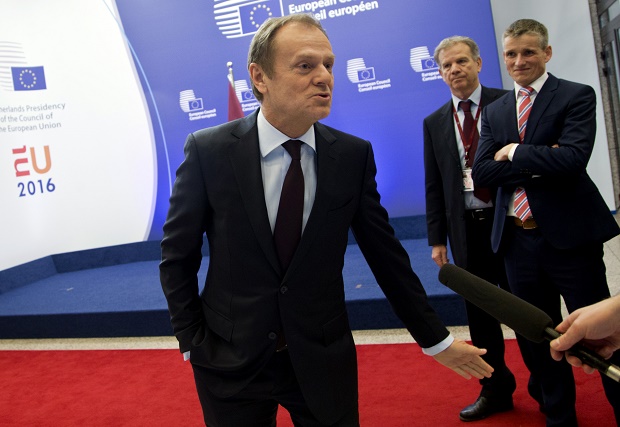Tusk warns ‘no guarantee’ of ‘Brexit’ deal as Merkel backs Cameron

European Council President Donald Tusk speaks with journalists as he arrives at the European Council building in Brussels on Wednesday, Feb. 17, 2016. European Union leaders will hold a summit in Brussels on Thursday and Friday to hammer out a deal designed to keep Britain in the 28-nation bloc. AP Photo
BRUSSELS, Belgium—European Council head Donald Tusk warned Wednesday there was “no guarantee” EU leaders would clinch a deal to keep Britain in the bloc at a crucial summit, as German Chancellor Angela Merkel backed London’s demands for reform.
Only hours before the make-or-break summit in Brussels, which he will chair, Tusk said: “After my consultations in the last hours I have to state frankly—there is still no guarantee that we will reach an agreement.”
READ: Crises rock European Union: What’s going on?
“We differ on some political issues and I am fully aware that it will be difficult to overcome them. Therefore I urge you to remain constructive,” he said in a formal letter of invitation to the EU’s 28 leaders for the two-day meeting, starting Thursday.
British Prime Minister David Cameron’s office released a statement saying talks between the two men would continue on Thursday.
“They agreed that good progress had been made in all four areas of our renegotiation, and that the draft texts presented a good basis for agreement at tomorrow’s European Council, subject to the satisfactory resolution of outstanding issues,” the statement read.
Cameron’s four key demands—welfare restrictions to help curb immigration, safeguards for non-euro Britain, increasing competitiveness and an opt-out from closer EU integration—have exposed sharp differences over what direction the European Union should take.
Merkel, the EU’s undoubted power-broker, earlier offered the British premier her support with the caveat that any changes must not compromise fundamental EU values, such as the free movement of people.
READ: UK’s Cameron appeals to Germany to help avoid ‘Brexit’
“Like David Cameron, I believe that it is necessary for the EU to improve our competitiveness, transparency and (reduce) bureaucracy. Germany has shared these concerns for many years,” she said.
‘Hammer blow’
Cameron faces a battle at home to convince sceptics, including many in his own party, that his demands represent a good deal for Britain.
Heaping pressure on the prime minister, several right-leaning British newspapers reported on their front pages Thursday that the number of EU workers to Britain had grown to two million.
“2M EU migrants grab our jobs” was the headline of the eurosceptic Daily Express, while The Times described the figures as a “hammer blow” to Cameron.
The premier held one-on-one talks Wednesday with London mayor Boris Johnson, a colourful Conservative who eurosceptics hope will spearhead efforts to pull Britain out of the European Union.
A source close to Johnson, seen as a potential successor to Cameron, said the mayor was “genuinely conflicted” about whether to back staying in the EU, or leaving.
“I’ll be back. No deal,” Johnson said after talks at Cameron’s 10 Downing Street residence.
Cameron has promised Britons an in-out EU membership referendum by 2017, but it is widely expected that if he can get a deal in Brussels, he will call the vote for June.
If he fails, however, and he has said anything is possible—including Britain becoming the first country to leave a bloc that critics believe is heading towards becoming a super-state.
The key sticking point is Cameron’s demand that EU citizens working in Britain should not be allowed to claim welfare benefits for four years.
Brussels has offered an “emergency brake,” which Britain could invoke if its welfare system is overwhelmed by the inflow of workers, as it says it has been.
Difficult and argumentative
Cameron says these changes are essential to give London control over immigration, but Poland and other east European states who have hundreds of thousands of workers in Britain say it will discriminate against them and undercut the EU’s core principle of freedom of movement.
Diplomatic sources said the upcoming summit could be difficult and argumentative.
Asked which of Cameron’s demands was most contentious, one source said: “It is too difficult to say which one is the most difficult!”
Merkel also reminded her EU peers they must tackle a migrant crisis which has seen more than one million refugees come to Europe via Turkey and Greece, which has been overwhelmed by the numbers.
Germany has taken in most and Merkel insists Europe must welcome more, if no longer with open arms then at least with a charitable attitude.
Others such as Austria, Hungary and their Balkan neighbours have reintroduced border controls to stem the influx, however, jeopardising the passport-free Schengen zone based on the principle of free movement.
Merkel is under heavy domestic pressure to reduce arrivals and so supports a plan under which Turkey would seal its borders and then fly refugees to Europe to be settled under an EU quota system.